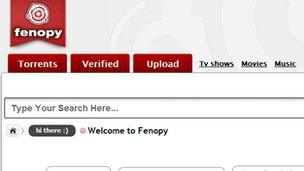Court orders UK ISPs to block more piracy sites
- Published

The BPI says blocking sites helps protect the revenue streams needed to create new music
The High Court has ordered the UK's major internet service providers to block three websites offering links to pirated material.
The ISPs must stop their users from accessing Kickass Torrents, H33T and Fenopy.
Music industry group the British Phonographic Industry (BPI) said the sites infringed copyright on a "significant scale".
Opponents have argued that blocking sites in this way was ineffective.
The block follows a similar ruling last year involving The Pirate Bay, a much larger site founded in Sweden.
Data seen by the BBC suggested that the blocking of The Pirate Bay had only had a short-term effect on the level of pirate activity online - with levels of peer-to-peer sharing returning to normal soon after.
However, a recent report from market research firm NPD suggested that there had been a large reduction in the number of users illegally downloading music, with fans instead favouring legal options like streaming site Spotify.
Speaking of Thursday's decision, BPI chief executive Geoff Taylor said: "The growth of digital music in the UK is held back by a raft of illegal businesses commercially exploiting music online without permission.
"Blocking illegal sites helps ensure that the legal digital market can grow and labels can continue to sign and develop new talent."
Loz Kaye, the leader of Pirate Party UK, which had offered UK users a workaround for the ban on The Pirate Bay, said the BPI was "out of control".
"The British music industry has nothing positive to show from their site blocks and personal legal threats," he said.
"Looking at sales figures from 2012, you can't draw the conclusion that stopping access to the Pirate Bay did anything to help artists.
"The UK has now handed the power over what we see on the internet to corporate lobbyists."
- Published23 October 2012
- Published17 October 2012
- Published11 September 2012
- Published2 September 2012
- Published16 July 2012